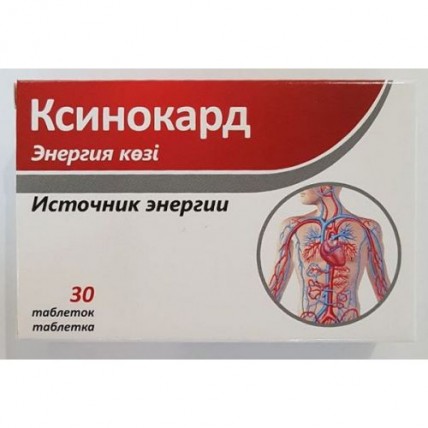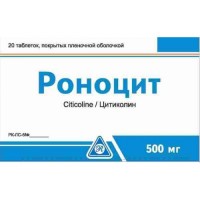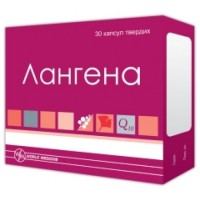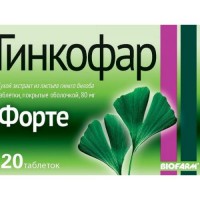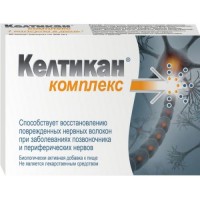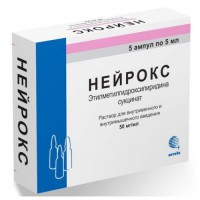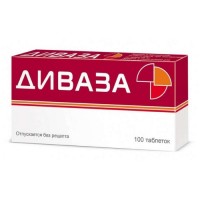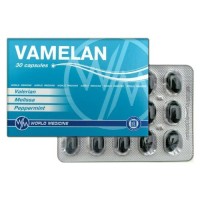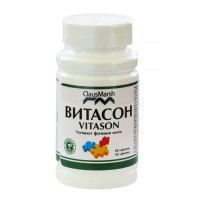Recommended for use for
- Ischemic and hypoxic conditions of the myocardium, in order to improve blood circulation, metabolism and restore functional activity.
- Ischemic and hypoxic conditions of the brain, in order to improve blood circulation, metabolism, restoration of functional activity.
- Intense physical activity in order to improve muscle activity
- In order to increase resistance to stressful conditions.
- In order to reduce weight by breaking down fats.
- With diabetic diseases in order to improve metabolic processes.
- In children and adolescents with lagging behind in growth and muscle mass.
- In renal failure, to eliminate primary and secondary carnitine deficiency.
- For the purpose of rehabilitation after serious illness.
Contents:
- Carnitine - 500 mg;
- Coenzyme - Q - 40 mg;
- Quercetin - 25 mg
Pharmacological group:
Cardioprotector, neuroprotector, cytoprotector, activator of cell metabolism.
L-carnitine (levocarnitine, vitamin BT, vitamin B) is an amino acid included in the group of vitamins B. It has 11 anabolic, antihypoxic and antithyroid effects. Accelerates fat metabolism, stimulates cell and tissue regeneration, increases appetite. L-carnitine is synthesized in the liver and kidneys, and is distributed to all organs and tissues. The synthesis of levocarnitine proceeds with the participation of vitamins C, B3, B6, B9, B12, iron, lysine, methionine and some enzymes.
With a deficiency of at least one of the components, L-carnitine deficiency may develop with impaired body functions. L-carnitine transports fatty acids (structural elements of fat) into the mitochondrial matrix, where they are destroyed with the release of energy. L-carnitine supplementation is carried out in the hope of intensifying fat breakdown. Studies have proven the effectiveness of carnitine in increasing stress tolerance and increasing the adaptive capabilities of the human body.
L-carnitine maintains the level of free ^ QdACH, which is involved in the detoxification of organic acids and xenobiotics, is necessary for the functioning of certain enzymes and for the normal functioning of the Krebs cycle. L-carnitine enhances the secretion of digestive enzymes, improves food absorption and reduces body weight. It increases the storage of glycogen in the liver and muscles and thereby raises the energy potential of the body.
Coenzyme Q10 (ubiquinone) is a coenzyme that causes a vitamin-like effect on the body. There is a strong antioxidant activity and the ability to influence redox reactions in cells. Ubiquinone is incorporated into the electron transfer chain in the mitochondrial apparatus (from the complexes of NADH dehydrogenase and succinate dehydrogenase) with an increase in ATP synthesis. Coenzyme Q10 optimizes oxidative phosphorylation processes. This improves the supply of energy to cells.
Myocardial tissues and hepatocytes especially need to replenish the reserves of coenzyme Q10. Ubiquinone restores the anti-free radical activity of vitamin E. Ubiquinone participates in the reeulation of the oily metabolism and optimizes metabolic processes. - Ubiquinone - is a participant in the synthesis of erythrocytes and other blood cells, has a positive effect on the functions of the thymus gland.
Ubiquinone is involved in the contraction of skeletal muscles. It realizes its antioxidant effect by interacting with free radicals with their subsequent neutralization. By neutralizing free radicals, the substance protects the cell membrane and DNA from free radical damage. Ubiquinone has a positive effect on the functioning of the immune system, slows down the aging process at the cellular level.
Dihydroquercetin is the reference antioxidant. It has powerful anti-inflammatory and anti-allergenic properties, strengthens and restores connective tissue, helps to lower cholesterol levels, enhances the effect of many beneficial substances (vitamin C and vitamin E); strengthens blood vessels and capillaries, improves blood microcirculation, prevents the formation of blood clots, reduces inflammation in the prostate, strengthens the immune system. Protects the stomach and liver from harmful effects, activates the processes of regeneration of the gastric mucosa.
Provides pronounced prevention of the main diseases of aging:
cancer, cardiovascular diseases, brain diseases, etc. Increases the resistance of body tissues to the damaging effects of excess blood sugar, reduces the likelihood of diabetes, and also facilitates the developed forms. It has a positive effect on the nervous system, activates nervous processes.
Contraindications
Hypersensitivity to drug components.
Side effect
Ksinocard is usually well tolerated
Rarely: allergic reactions, weakness.
Uses
- For self-use by the consumer, it is recommended to comply with the standards indicated on the packaging. If the drug is prescribed a doctor, a change in dosage is possible: 1 tablet 2-3 times a day.
- Ksinocard is taken orally with a sufficient amount of water.
Overdose
Symptoms: dizziness, abdominal cramping, nausea, vomiting.
Treatment: gastric lavage is possible, symptomatic therapy if necessary.
Release form
Ksinocard No. 30. 3 blisters of 10 tablets each with a leaflet in a cardboard box.
Storage conditions
Store in a dry, dark place and out of reach of children at a temperature not exceeding 20° C.
Shelf life
Indicated on the package and blister. Do not use after the expiration date.
